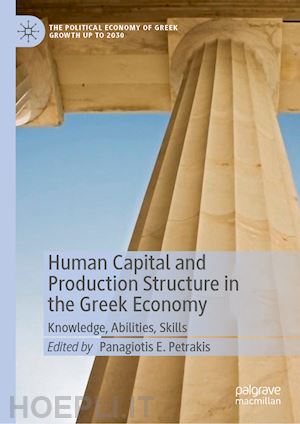
Questo prodotto usufruisce delle SPEDIZIONI GRATIS
selezionando l'opzione Corriere Veloce in fase di ordine.
Pagabile anche con Carta della cultura giovani e del merito, 18App Bonus Cultura e Carta del Docente
The role of human capital has diversified considerably in the last 100 years. Today, the prevailing perception seeks a sustainable, integrated development which is based on the triptych of environment, economy, and society. In this mode of development, human capital has a positive effect on the economy, on social cohesion and optimal governance, as well as on the ecological footprint.
Part A: Human Capital and Structural Change.- Chapter 1: The Role of Human Capital in Economic Development in the 21st Century.- Chapter 2: Human Capital and Structural Economic Transformation.- Chapter 3: Occupational Characteristics Analysis.- Chapter 4: Productive Structure, Technological Change and Requirements in Human Capital.- Part B: Structural Relations and Structural Changes in the Greek Economy.- Chapter 5: Sectoral Analysis of the Economic Activity of the Greek Economy, Input - Output Analysis.- Chapter 6: Estimation of the Medium-term Demand for Occupations and Specialities in the Greek Economy Using an Input – Output Analysis.- Part C: Analysis of Human Capital Requirements in Greece.- Chapter 7: Restructuring the Greek Labor Market During the Last Two Economic Crises.- Chapter 8: The European Experience in Lifelong Learning and the Restructuring of the Economy.- Chapter 9: Labor Market Analysis Based on the Knowledge, Skills, Abilities and Working Activities of Employees in the Present and Future Production Structure of 2027.
Panagiotis E. Petrakis is Emeritus Professor in the Department of Economics at the National and Kapodistrian University of Athens, Greece, where he serves as Scientific Coordinator of Distance Education Training Programs. He was chairman of the Department of Economics at National and Kapodistrian University of Athens from 2005 to 2009. He is the author of numerous scientific articles and monographs and has extensive publications in recognized academic journals on economic development, entrepreneurship, and cultural background.











Il sito utilizza cookie ed altri strumenti di tracciamento che raccolgono informazioni dal dispositivo dell’utente. Oltre ai cookie tecnici ed analitici aggregati, strettamente necessari per il funzionamento di questo sito web, previo consenso dell’utente possono essere installati cookie di profilazione e marketing e cookie dei social media. Cliccando su “Accetto tutti i cookie” saranno attivate tutte le categorie di cookie. Per accettare solo deterninate categorie di cookie, cliccare invece su “Impostazioni cookie”. Chiudendo il banner o continuando a navigare saranno installati solo cookie tecnici. Per maggiori dettagli, consultare la Cookie Policy.